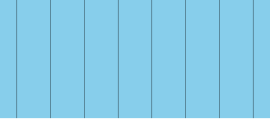Apeirogonal hosohedron
| Apeirogonal hosohedron | |
|---|---|
 | |
| Type | Regular tiling |
| Vertex configuration | 2∞ [[File:|40px]] |
| Face configuration | V∞2 |
| Schläfli symbol(s) | {2,∞} |
| Wythoff symbol(s) | ∞ | 2 2 |
| Coxeter diagram(s) | |
| Symmetry | [∞,2], (*∞22) |
| Rotation symmetry | [∞,2]+, (∞22) |
| Dual | Order-2 apeirogonal tiling |
| Properties | Vertex-transitive, edge-transitive, face-transitive |
In geometry, an apeirogonal hosohedron or infinite hosohedron[1] is a tiling of the plane consisting of two vertices at infinity. It may be considered an improper regular tiling of the Euclidean plane, with Schläfli symbol {2,∞}.
Related tilings and polyhedra[]
The apeirogonal hosohedron is the arithmetic limit of the family of hosohedra {2,p}, as p tends to infinity, thereby turning the hosohedron into a Euclidean tiling. All the vertices have then receded to infinity and the digonal faces are no longer defined by closed circuits of finite edges.
Similarly to the uniform polyhedra and the uniform tilings, eight uniform tilings may be based from the regular apeirogonal tiling. The rectified and cantellated forms are duplicated, and as two times infinity is also infinity, the truncated and omnitruncated forms are also duplicated, therefore reducing the number of unique forms to four: the apeirogonal tiling, the apeirogonal hosohedron, the apeirogonal prism, and the apeirogonal antiprism.
| (∞ 2 2) | Parent | Truncated | Rectified | Bitruncated | Birectified (dual) |
Cantellated | Omnitruncated (Cantitruncated) |
Snub |
|---|---|---|---|---|---|---|---|---|
| Wythoff symbol | 2 | ∞ 2 | 2 2 | ∞ | 2 | ∞ 2 | 2 ∞ | 2 | ∞ | 2 2 | ∞ 2 | 2 | ∞ 2 2 | | | ∞ 2 2 |
| Schläfli symbol | {∞,2} | t{∞,2} | r{∞,2} | t{2,∞} | {2,∞} | rr{∞,2} | tr{∞,2} | sr{∞,2} |
| Coxeter-Dynkin diagram | ||||||||
| Vertex config. | ∞.∞ | ∞.∞ | ∞.∞ | 4.4.∞ | 2∞ | 4.4.∞ | 4.4.∞ | 3.3.3.∞ |
| Tiling image | ||||||||
| Tiling name | Apeirogonal "dihedron" | Apeirogonal "dihedron" | Apeirogonal "dihedron" | Apeirogonal "prism" | Apeirogonal "hosohedron" | Apeirogonal "prism" | Apeirogonal "prism" | Apeirogonal "antiprism" |
Notes[]
- ^ Conway (2008), p. 263
References[]
- The Symmetries of Things 2008, John H. Conway, Heidi Burgiel, Chaim Goodman-Strass, ISBN 978-1-56881-220-5
External links[]
- Apeirogonal tilings
- Euclidean tilings
- Isogonal tilings
- Isohedral tilings
- Regular tilings
- Digonal tilings
- Infinite-order tilings
- Geometry stubs

